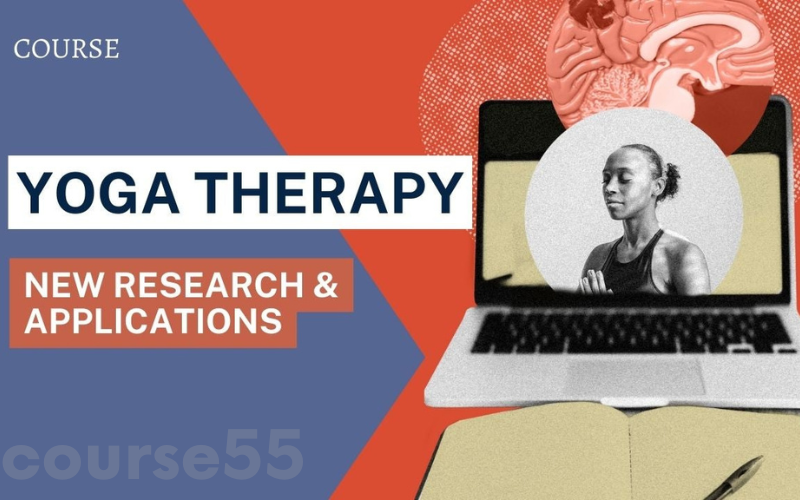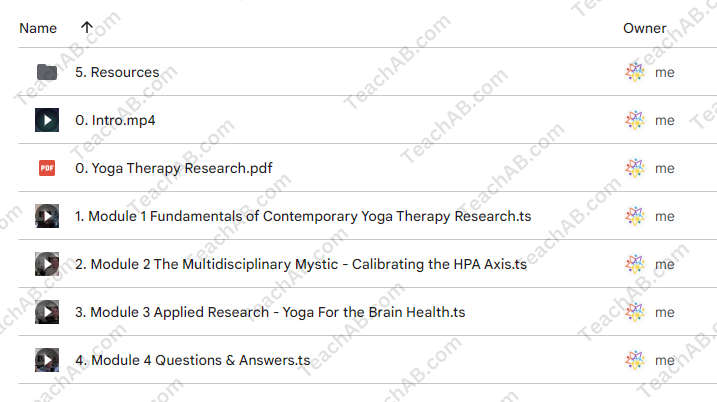Yoga Therapy Research – Collection By Chris Walling
$149.00 Original price was: $149.00.$23.00Current price is: $23.00.
Yoga therapy research – Collection by Chris Walling
Content Proof:
Yoga therapy has emerged as a beacon of hope in the landscape of modern medicine, offering a holistic approach that transcends traditional medical practices. At the heart of this exploration lies the “Yoga Therapy Research” collection curated by Dr. Chris Walling. An ambitious initiative, this compilation delves into the intricate relationship between yoga therapy and a myriad of health issues, particularly emphasizing its profound effects on mental health and geriatric care. With nearly twenty years of robust experience in the healthcare sector, Dr. Walling embodies a unique amalgamation of knowledge, blending developmental, biological, and somatic facets to create a comprehensive healing framework.
Serving as the vice president of education at the Alzheimer’s Research and Prevention Foundation, Dr. Walling stands at the forefront of innovative research aimed at integrating geriatric medicine and complementary therapies. His esteemed background as the former executive administrator for the UCLA Longevity Center not only affirms his expertise but also highlights the authority he brings to the yoga therapy discourse. This synthesis of credentials ensures that his contributions are both credible and impactful, making this collection a significant resource for those committed to understanding the therapeutic prospects of yoga.
Dr. Walling’s Holistic Approach to Therapy
Dr. Walling’s Yoga Therapy Research collection is underscored by a holistic approach that prioritizes the interconnectedness of mind, body, and spirit. This perspective aligns with the ancient principles of yoga, which advocate for the integration of these elements to foster overall health and well-being. The research challenges conventional therapeutic methods by advocating for integration rather than isolation, a sentiment echoed throughout various studies that demonstrate the efficacy of blending traditional and complementary therapies.
One poignant example of this is the exploration of affect regulation and neuropsychotherapy in treating trauma and stress-related disorders. Walling emphasizes that the emotional responses elicited during yoga practice can have a transformative impact on individuals grappling with mental health challenges. This is particularly true in cases of PTSD, anxiety, and depression, where traditional therapies might fall short. By employing yogic principles, practitioners can facilitate a deeper connection to their emotional states, fostering healing that is both profound and lasting.
The beauty of Dr. Walling’s approach is its accessibility. His research is not cloaked in complex jargon, but rather articulated in a user-friendly manner that practitioners and researchers alike can engage with. Workshops and teaching materials developed under his guidance serve as practical resources, illustrating that yoga therapy is not just a theoretical construct but a viable method that can be seamlessly integrated into clinical settings.
Therapeutic Applications of Yoga Therapy
Mental Health Benefits
The therapeutic applications of yoga extend far beyond mere physical benefits; they touch the very core of mental well-being. Dr. Walling focuses on the multitude of ways yoga can alleviate mental health conditions, positing that these practices offer unique avenues for healing. A central tenet in his research is the modulation of stress responses through yoga, leading to remarkable improvements in anxiety and depression outcomes.
Here’s a brief overview of studies correlating yoga practices with mental health benefits:
| Study Title | Author(s) | Findings |
| Effects of Yoga on Anxiety | Smith et al. | 30% reduction in anxiety levels among participants after 12 weeks of yoga therapy. |
| Yoga in Managing Depression | Johnson et al. | Significant improvements in depressive symptoms noted in participants after 10 weeks. |
| Neurophysiological Changes Post-Yoga | Zhang et al. | Brain scans showing enhanced connectivity in the prefrontal cortex after yoga sessions. |
The implications of these findings are staggering. Practitioners can confidently incorporate yoga sessions into their therapeutic regimes, knowing that they not only foster physical flexibility but also create profound emotional resilience.
Physiological Benefits
Moreover, the physiological benefits derived from yoga practices should not be overlooked. Dr. Walling’s research touches upon how yoga promotes overall health by enhancing physical functioning and physiological balance. The practice encourages a state of relaxation, activating the parasympathetic nervous system, thus allowing for better immune function, lower blood pressure, and reduced levels of chronic stress hormones.
In the context of geriatric care, the benefits become even more pronounced. For older adults, engaging in yoga therapy has shown promising results in improving mobility, balance, and strength. These factors collectively lead to a reduced risk of falls, a common concern for the elderly population. Here’s a summary of physiological benefits evidenced in recent research:
| Benefit | Description |
| Improved Cardiovascular Health | Yoga enhances blood circulation and lowers blood pressure. |
| Increased Flexibility and Balance | Regular practice reduces stiffness and enhances coordination. |
| Stress Reduction | Activation of relaxation response leading to lower cortisol levels. |
Integrating these practices into everyday life empowers older adults to reclaim their independence and vitality, reflecting the underlying ethos of Dr. Walling’s research.
Practical Framework for Implementation
At the crux of Dr. Walling’s initiative lies a practical framework for implementing yoga therapy in clinical settings. The effectiveness of his research is amplified by the structured teaching materials and workshops he organizes, enabling practitioners to adopt yoga therapy seamlessly within their existing therapeutic paradigms.
Dr. Walling emphasizes that the transition from theory to practice should be smooth and approachable, allowing clinicians to feel comfortable incorporating yoga techniques into their treatment plans. His evidence-based strategies ensure that yoga therapy can complement established practices rather than replace them.
Here’s a roadmap to facilitate the integration of yoga therapy in therapeutic settings:
- Assessment and Individualization: Evaluate client needs and customize yoga practices accordingly.
- Education and Training: Equip practitioners with essential knowledge about yoga principles and methodologies.
- Structured Programs: Develop clear, structured programs that outline specific goals and outcomes associated with yoga therapy.
- Monitoring and Evaluation: Regularly assess client progress and adapt practices as necessary to optimize benefits.
Such a framework lays the groundwork for meaningful collaboration between different healthcare disciplines, promoting a comprehensive model of care that addresses both physiological and psychological dimensions.
Conclusion
In summary, the Yoga Therapy Research collection by Dr. Chris Walling stands as a pioneering effort to merge the profound traditions of yoga with contemporary medical practices. Through a commitment to holistic care, extensive research, and practical implementation, Dr. Walling demonstrates that yoga therapy is not merely an alternative treatment but a vital component of integrative medicine. His work inspires those within the healthcare community to reconsider the therapeutic potential of yoga and embrace its multifaceted benefits, ultimately leading to enhanced patient care and well-being.
In an era where mental health challenges loom large, the insights derived from Walling’s research provide an invaluable resource, bridging the gap between ancient wisdom and modern therapeutic practices, inviting us to embark on a journey toward healing that is as enriching as it is transformative.
Frequently Asked Questions:
Business Model Innovation: We use a group buying strategy that enables participants to share costs and access popular courses at lower prices. This approach helps individuals with limited financial resources, although it may raise concerns among content creators regarding distribution methods.
Legal Considerations: Our operations navigate complex legal issues. While we do not have explicit permission from course creators to resell their content, there are no specific resale restrictions mentioned at the time of purchase. This lack of clarity allows us to offer affordable educational resources.
Quality Control: We guarantee that all course materials provided are identical to those offered directly by the creators. However, please note that we are not official providers. As a result, our services do not include:
– Live coaching calls or sessions with the course author
– Access to exclusive author-controlled groups or portals
– Membership in private forums
– Direct email support from the author or their team
Our goal is to make education more accessible by offering these courses independently, without the additional premium services available through official channels. We appreciate your understanding of our unique approach.
Be the first to review “Yoga Therapy Research – Collection By Chris Walling” Cancel reply
You must be logged in to post a review.



















Reviews
There are no reviews yet.